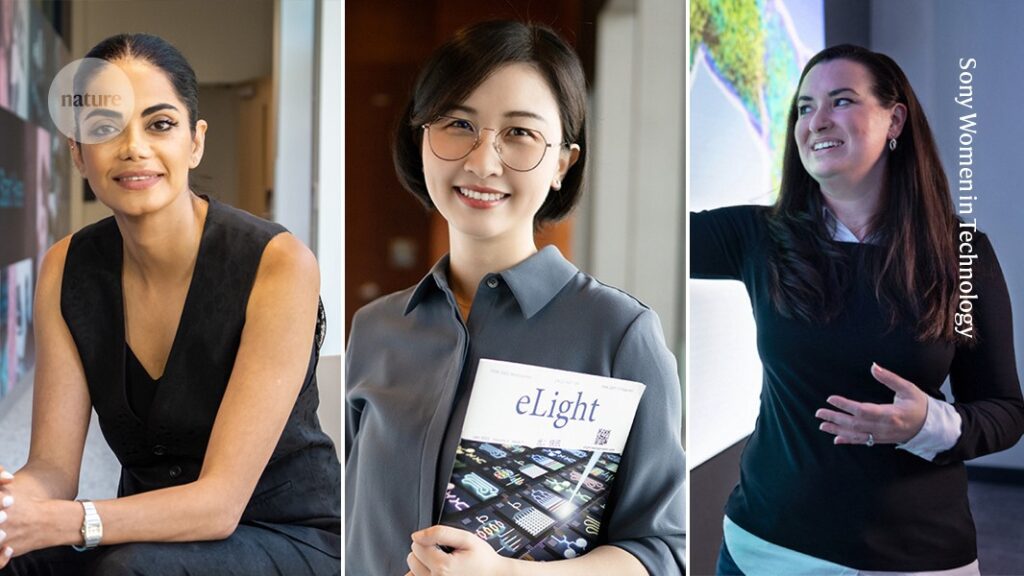From left to right: Kiana Aran, Yating Wan, and Amanda Randles.
Credit: Sony Women in Technology
Recently, three exceptional female researchers were honored with the first-ever Sony Women in Technology Award in collaboration with Nature. Each recipient was awarded $250,000 to propel their innovative, technology-driven research.
Kiana Aran: Pioneering Bioengineering
Kiana Aran from the University of California, San Diego, received a mid-career award for her groundbreaking work at the intersection of biology, artificial intelligence, electronics, and materials science. Her research focuses on developing fingertip sensors aimed at detecting genetic and viral diseases. In addition to her research efforts, Aran has founded a non-profit organization dedicated to mentoring women in engineering.
Amanda Randles: Innovating Computational Science
Amanda Randles, a computational scientist at Duke University in North Carolina, also garnered a mid-career award. Her innovative ‘digital twin’ technology, initially designed to assist with interventions for patients with heart disease, may now be expanded to provide early interventions for cancer, reflecting her commitment to improving healthcare through technology.
Yating Wan: Advancing Silicon Photonics
Yating Wan at King Abdullah University of Science and Technology in Saudi Arabia was recognized with the early-career award for her research in silicon photonics. Her work aims to enhance the energy efficiency of data communication and information processing. Additionally, Jiawen Li, a biomedical engineer from the University of Adelaide in Australia, received a special commendation for her development of a hair-thin endoscope for use in blood vessels, showcasing impressive advancements in nanometre-scale 3D printing and optical-fibre technology.
The Importance of Gender-Specific Awards
Despite some criticism towards gender-specific awards, the truth remains that these distinguished women would excel in any competitive selection process. Research indicates that women and other marginalized groups often receive disproportionately limited recognition in grants and awards within scientific and technological fields.
Currently, a smaller percentage of women apply for grants compared to their male counterparts, and when they do succeed, they tend to receive lesser award amounts. Although there are some encouraging initiatives underway to rectify this imbalance, progress remains slow. These circumstances reinforce the need for such awards and the importance of creating systems that amplify women’s contributions and provide vital support networks.
Broader Implications for Diversity
Recognizing female talent in science and innovation brings additional benefits. By fostering inclusivity, organizations, educational institutions, and research entities can enhance creativity, ultimately facilitating the achievement of their broader objectives.
For instance, Innovate UK, the UK’s largest public funder of innovation-focused research, has seen a significant uptick in successful grant applications from women-led teams since launching its annual Women in Innovation scheme, which offers £75,000 along with mentorship and networking opportunities. From earning one in seven grants in 2016, the number has now improved to an impressive one in three.
Advancing Representation in Academia
Kaori Hayashi, the executive vice-president of the University of Tokyo, emphasizes the importance of realistic numerical targets to increase women’s representation in academia. She addresses concerns that initiatives aimed at supporting women might unintentionally induce feelings of impostor syndrome, clarifying that these efforts are a necessary countermeasure to the pervasive negative biases faced by women in academia.
A Vision for Equality
While we anticipate the day when gender-specific awards are no longer necessary, until then, it remains crucial to celebrate and support the achievements of outstanding female researchers. The Nature Awards for Inspiring Women in Science are currently accepting nominations, dedicated to recognizing women who contribute to science and encourage future generations of women in STEM fields. Through such initiatives, we aim to create a more inclusive atmosphere where women’s voices are empowered and their significant contributions to research are celebrated.


